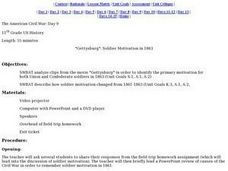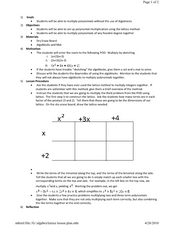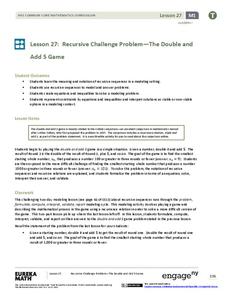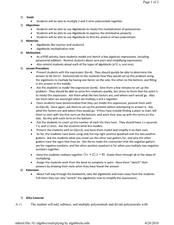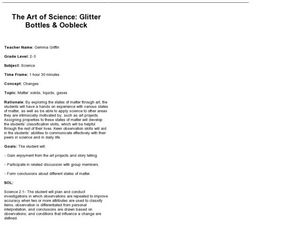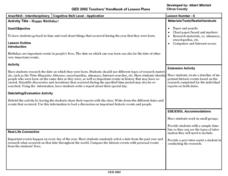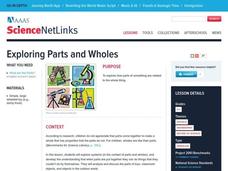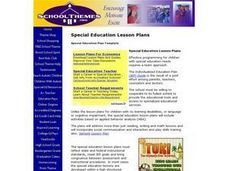Curated OER
Picture Your Future Self
High schoolers research careers using the internet and newspapers. As a group, they create a newsletter about careers of the future.
Curated OER
"All About Me" Posters
Third graders discover themselves by creating a poster to present the class. In this personal habits lesson, 3rd graders identify characteristics that make them unique and explore goals they wish to accomplish. Students...
Shodor Education Foundation
Simple Maze Game
Avoid the mines and win the game! Young scholars direct a robot through a minefield by plotting points. Their goal is to reach the target in as few moves as possible.
Curated OER
The Mandelbrot Set
Learners explore the concept of Mandelbrot sets and Julia sets. In this Mandelbrot and Julia set lesson, students use a function integrator applet to investigate two-variable function iterations. Learners use Julia set and Mandelbrot set...
Curated OER
"Gettysburg": Soldier Motivation in 1863
Eleventh graders watch and discuss various clips from the movie "Gettysburg". Using the video, they identify the main motivation for the Union and Confederate soldiers. They describe how soldiers motivation changed from 1861 and 1863.
Curated OER
Students Multiply Polynomials without Algeblocks
Introduce your class to the lattice method as a way to multiply polynomials. This lesson plan is specifically aimed at getting students to use methods other than Algeblocks to solve polynomials.
Curated OER
Using Poster Presentations with ESL Students
Students organize ways to present effective poster presentations. Students skill their posters by the majors they have chosen. Students engage in researching how to use their collaboration time in groups effectively.
National Park Service
What Can We Do?
Motivate young conservationists to stand up and make a change. After learning about the efforts in Cascade Nation Park to reduce carbon emissions in order to preserve the wilderness, students work in groups creating action plans for...
EngageNY
Recursive Challenge Problem—The Double and Add 5 Game
As a continuation of a previous activity, this activity builds on the concept of calculating the terms of a sequence. Pupils are challenged to determine the smallest starting term to reach a set number by a set number of rounds. Notation...
Curated OER
Ready-Set-Tech: When a Volcano Erupts
Wouldn't it be a blast to uncover the science behind volcanic eruptions? Explore, research, and examine the nature of volcanoes with three fun hands-on projects kids will love. First the class takes to the Internet to research volcanoes....
Curated OER
Students Multiply Polynomials
Factor polynomial functions that have two and three terms. Using Algeblocks, your class will create models to show their understanding of these concepts.
Curated OER
Take the One-Tonne Challenge!
Students explore about the One-Tonne Challenge, and work out how they could reduce their greenhouse gas emissions (GHGs) by one tonne, through individual actions and by influencing other people. Students use a GHG emission table to...
Curated OER
The Art of Science: Glitter Bottles and Oobleck
After having a class discussion on the three states of matter, young scientists utilize the wonderful substance, Oobleck in order to experience something that changes states of matter. They also create "sparkle jars" which...
Curated OER
Crash Course in Flight
High school physicists demonstrate Bernoulli's Principle by blowing on different items and finding that they do not move in the expected direction! They apply Bernoulli's equation to the flight of an airplane. This well-organized lesson...
Curated OER
Happy Birthday!: Internet Research and Historic Events
Talk about intrinsic motivation! Begin where your students' natural interests lie -- with themselves -- and launch a variety of projects with this activity. Class members research important events that took place on their...
Curated OER
Exploring Parts and Wholes
Students explore the concept of parts making up a whole. In this parts and whole lesson, students come to understand that parts of a system must come together in order for the system to work properly. Students investigate items indoors...
Curated OER
Happy Feet=Healthy Body
Fourth graders discuss the benefits of regular exercise. In this physical health studies lesson, 4th graders create visual demonstrations to track their progress with physical fitness related goals. Students discuss various...
Curated OER
Immigration Connections: The Squamish Nation and Bainbridge Island Filipino Americans
High schoolers explore ancestry and immigration. In this Canadian immigration lesson, students interview their family members to identify their cultural history. They compose an essay that compares Filipino immigration stories to those...
Curated OER
How are Seeds the Same and Different?
Students examine seeds from various plants. In this science lesson, students cut open fruits and vegetables in order to see the seeds. Students describe each type of seed and classify the seeds.
Curated OER
Story Retelling
Students explore storytelling by participating in an image analysis activity. In this story structure lesson, students read the book Cookie's Week by Tomie dePaola and retell the story to their teacher in sequential order. Students...
Curated OER
Art On Trial (A Mock-Court Activity)
Students engage in a mock trial to decide if a work of prospective public art is "art" and accepted for a city park. They broaden their definitions of what "art" is. Students distinguish between opinion and informed judgment of art works.
Curated OER
Sampling Rocks
Students analyze rocks. In this geology lesson, students collect rocks from the schoolyard and sort them according to various characteristics, such as color, size, and weight.
Curated OER
Sampling Rocks
Students collect and sort rocks based on visible characteristics. For this statistics lesson, students determine adequate sample size and categorize rocks based on characteristics. The book Everybody Needs a Rock is read to...
Curated OER
Special Education Plan
Special needs students practice completing everyday tasks such as organizing a day plan, reading a clock and completing simple math problems. They define the proper learning techniques for their disorder and utilize props in...




